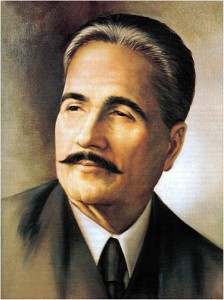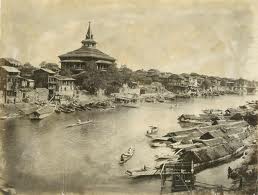Peace Watch » Editor's Take » Dr. Iqbal Dreamt of Kashmir’s Freedom
Dr. Iqbal Dreamt of Kashmir’s Freedom
Zahid G Muhammad
Momentous day in the life of a leader, writer or poet is when he sees his ideas translated into reality. Iqbal did not live up to the day when his dream of a separate nation for Muslims of South Asia became a reality on 14 August 1947. He was not a part of the galaxy of leaders of the Muslim League that had gathered in the Minto Park, Lahore on 24 March 19, 1930 to see enthusiastic crowds greeting with thundering applause the idea of ‘Muslim Homeland’ he had set afloat at the annual session of the All India Muslim League on December 29, 1930 in Allahabad. Two years before the Lahore Resolution now known as Qarardad-e-Pakistan was adopted he had departed from this world.
Momentous day in his life has been when people of Jammu and Kashmir revolted against the brutal feudal autocracy. He saw the day as his dream coming true. ‘Dr. Mumtaz Hassan has said that one day when he was sitting with Allama Iqbal and discussing political struggle in Kashmir. Mentioning about a Persian Poem ‘Saqi Nama’ in Payam-e-Mashriq, which he had written in Nishat Bagh, Kashmir (1920) Allama told him: “In one of the verses, I had mentioned about silk factories and workers working there in. I am amazed Kashmir political struggle started with rebellion by workers of a Silk factory in 1924.”
‘Mumtaz has said that he possessed signed copy of Payam-e-Mashriq that was published in 1932, containing the verses starting with ‘Baresham Qaba.’ In same poem, Allama Iqbal prayed to God to ‘Bring revolution in the hearts of Kahmiris so that they can live with honor in this world……’ ( Rozgar-e-Fiqar page 358) Allama Iqbal had communicated same to Molvi Abdul Haq through his letter. (Book: Allama Iqbal aur Abdul Haq, Letters, Page 56,)
A year or so back, in this column looking at Allama Muhammad Iqbal’s role in Kashmir freedom movement from 1909, till he breathed his last I had said that I see this epoch making poet as founder of Kashmiri struggle. It had ruffled feathers of some friends who had concluded that through this statement I had diminished the role played by Mirza Bahir-ud-Din Mahmud head of the Ahmadiya Movement of Qadian who headed the All India Kashmiri Committee established after the massacre of Muslims in Srinagar in 1931. Nevertheless, there can no denying that Iqbal was the “guiding light” as called by eminent international scholar Hafiz Malik “of the Kashmir Committee”. He was the spirit behind mobilizing the public opinion in support of the people of Kashmir and organizing Kashmir Day on August 14, 1931. Muslim across India came in support of Kashmiris when Iqbal issued an appeal, which few others also signed. The appeal read:
“After attacking repeatedly the enemy has deluded itself into believing that Muslims are a dead nation. To refute this misbelief it is your obligation to make the Kashmir Day a resounding success. By actions Muslims must demonstrate that they were not going to be willing victims of their enemies’ injustice and repression.”
The July massacre in Kashmir was heavy on Iqbal’s mind. It had bruised his heart. ‘He raised donations for victims of violence, and sent these to Kashmir leaders. In addition, he persuaded some-well-known lawyers to visit Kashmir with a view to provide legal aid to jailed Kashmiris. The authorities expelled these leaders and some including Dr. Iqbal were banned from entering into Kashmir. “It is noteworthy”, writes Dr. Hafiz Malik, “That due to Iqbal’s efforts the Glancy Commission was appointed by the British government, which recommended variety of constitutional reforms in the state after conducting a thorough investigation.”
His stirring speech on 14 August 1931, on Kashmir Day about Muslims in India and Punjab not having been deeply interested in the affairs of Kashmir- even Punjabis of Kashmiri origin being ignoramus about plight of their brethren had woken up the Muslims in India more particularly in Punjab about the plight of Muslims in Jammu and Kashmir:
“Actually the political movement (against British) was bound to rouse the people of Kashmir. Consequently, they became like their neighbors. The modern times are politicizing the people; and people of Kashmir were going to rise in protest and demand the grant of their rights. This was net political consequences of oppression, which the people of Kashmir have endured… History bears witness to fact that people who conquer a country cannot rule without support of its population.”
Iqbal defeated some hideous moves for using the Kashmir Committee as vessel for spreading of a particular religious doctrine that he believed was against the tenets of Muslim faith. That could also create further confusion amongst Kashmiri Muslims who had already fragmented in three groups. He equated Kashmir Movement with the Khilafat movement of 1920 that’ reflected the Islamic impulse in practical terms’. To help the people of Kashmir, on 30 June 1933, he and Malik Barkat Ali secretary of newly reconstituted All India Kashmir Committee issued an appeal to help the people of Kashmir and raise funds:
“Kashmiris are an inseparable part of the Muslim nation; and to separate their fate from our national destiny amounts to consign the entire nation to self-destruction.”
In this long highly empathetic appeal every word of which is important he said, “If Kashmiris were alive and enjoyed the life of an energized nations their innovative skills could help in improving the economic conditions of India. It may be stated that people of Kashmir are the best part of the Muslims in India, and that part is in pain and anguish then it is impossible for other members of nation to sleep in peace.”
‘The period of September 1931- February 1932 was exceptionally busy in Iqbal’s life. By this time he was acknowledged as Muslim leader and thinker. Nevertheless, the cause of Kashmir was so dear to the philosopher-poet of the East that he missed no opportunity to talk about Kashmir. His presidential address on being elected President of the All India Muslim Conference on March 21, 1932 held at Lahore indicates how deeply he felt concerned about Kashmir. But Kashmir leaders who for past eighty years have been parroting his poetry have betrayed him by not heeding to his all time advice contained in his statement issued on 7 June 1933:
“I appeal to Muslims of Kashmir to beware of the forces that are working against them and to unite their ranks. The time for two or three Muslim political parties in Kashmir has not yet come. The supreme need of the moment is a single party representing all Muslims in the State.”
He warned these leaders, “If perfect unanimity of political opinion is not secured in Kashmir, all efforts to advance the interests of the people of the State will prove in effective.”
This warning of Dr. Iqbal to Kashmir holds as good today as it was eighty years back- but there no takers amongst Kashmir leaders.
Filed under: Editor's Take · Tags: Allama Iqbal, Azaadi, dream freedom, Freedom Struggle, Iqbal Kashmir







